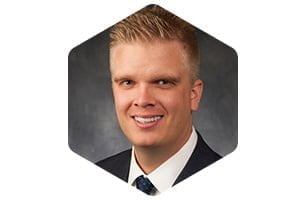
Joseph Rothwell
Trader, Global Multisector Fixed Income
Manulife Investment Management

Liam Heraty
Head of Content
The Finance Hive
Undeniably the role of the trader has transformed over the past five years. More than ever, traders are now expected to be macro strategists, data analysts, coders and market structure specialists as well as fulfilling the traditional execution mandate of a trader, driven by a need for desks to contribute more to PM decision making and adding value to the wider business.
There has never been a better time for traders to come together to benchmark on these new challenges and priorities. So, our Head of Content sat down with Joe Rothwell, Trader, Global Multisector Fixed Income at Manulife Investment Management to talk about how his role has completely changed, and how others can manage the transition and add value to the process.
The trader will need to be a combination of macro strategist, data analyst, and market structure specialist.”
The modern buy side trader needs to wear a lot of hats and adapt to a changing environment both in markets and in asset management as a whole.”
The best desks are able to curate that information for the specific PMs.”
There needs to be an effort to have fulfilling, mutually beneficial relationships with internal stakeholders such as PMs, compliance, middle and back office, client-facing teams, as well as end clients.”
It is imperative that the trader understands the needs of their internal clients and PM teams.”
Information curation is a key skill to identify the forward thinkers that you should be listening to. What this also fosters is listening to opinions outside of your own, which can help eliminate confirmation biases from forming.”
There needs to be a balance between experience and a willingness to change.”
The trader needs to have a stake in the outcomes of the PM teams to align the overall vision for a firm.”
Traders will need to feel empowered by their firms to try and make a difference and add value to their respective firms and they should have the resources to do that effectively.”
Liam Heraty: In what way would you say your role has changed most over the past 2 years – and what led to these changes?
Joe Rothwell: My specific role has changed dramatically over the past few years, but that is more due to circumstances at our firm than anything. I am no longer executing FX and have taken on more of a discretionary role within our strategy. More generally, I think the industry is evolving and asking more from execution traders as firms look to optimise in all areas. I would expect the evolution to continue and to continue to ask more of an execution trader as a centre of knowledge to contribute to PM decision making.
JR: Firms are getting leaner, and I don’t think the traditional execution clerk role works anymore with the advent of increased automation and sped to execution. The trader will need to be a combination of macro strategist, data analyst, and market structure specialist. Technology providers allow for data to be at our fingertips and allow for faster and better information processing.
LH: How is your trading desk aligning with internal and external decision makers? And what impact does this have on liquidity?
JR: Part of the evolving role of traders is the relationship management of all stakeholders in the process. There needs to be an effort to have fulfilling, mutually beneficial relationships with internal stakeholders such as PMs, compliance, middle and back office, client-facing teams, as well as end clients. In addition to that, it is imperative to manage relationships with counter parties to achieve the overall vision of the desk and the key goal of getting best execution for our clients.
JR: This is why I believe the relationship side of the business is still as important as ever, even with the advent of increased electronic and push button trading. The modern buy side trader needs to wear a lot of hats and adapt to a changing environment, both in markets and in asset management as a whole.
LH: Traders are now expected to be the ‘eyes and ears’ of the market, looking beyond the traditional role of execution – where else can you add value, and what is the PM looking for?
JR: Information is available and a key skill for traders is filtering that information and understanding what the PM needs / wants. Buy side traders have access to incredible talent on the street and I find that the best desks are able to curate that information for the specific PMs. The trader needs to be viewed as a partner with the PM team and their clients. Just as we are treated as clients by the sell side and different vendors, the PMs need to be able to trust that they are receiving relevant, and different information.
JR: Another necessary skill is to know what PMs as clients are looking for. It is a key differentiator to identify the individual clients and the service that they need. For example, a dedicated EM strategy will be interested in very different news flow than a dedicated DM strategy. Being able to differentiate and curate that information for the internal clients separates the great buy side trader from an older clerk of the past.
LH: Is there a process you should have in place for relative value discussions with PMs?
JR: As mentioned, it is imperative that the trader understands the needs of their internal clients and PM teams. Communication and relationship building is part of the process and knowing what different strategies are looking for will help all parties. A lot of this communication is informal, but there should be a different nature with that. There should also be more formal communication processes (monthly or quarterly calls) to udnerstand what intention different PMs or strategies have in the short term, medium term, or long term. At the end of the day, a trader should be asking “how can I add value to the process” in addition to doing the fiduciary duty of getting best execution for our clients.
LH: What kind of resources and information can your trading desk use to help with idea generation?
JR: Resources are going to be a difficult decision as every desk is trying to be as lean as possible and third-party research and technology can be very expensive. With that being said, there are incredible research analysts and strategists at many of our partners who we should be drawing from. Information curation is a key skill to identify the forward thinkers that you should be listening to. What this also fosters is listening to opinions outside of your own, which can help eliminate confirmation biases from forming.
LH: How are you and your team evolving in this new environment, with greater demands and the need to find greater efficiencies?
JR: It is a constant evolution for a buy side desk. If I look back 10 years, we are doing things very differently now than we were then and information and technology are the driving force behind that. Markets are moving faster than ever, and the desk is being leaned on more heavily to decipher what is real and what is noise. There is more interaction with traders and PM teams to help understand strategies and what teams are looking for in different asset classes. The trader needs to have a stake in the outcomes of the PM teams to align the overall vision for a firm.
LH: What does this mean for the ‘trader of the future’ and the key skill sets hiring manager should look for to future-proof the desk?
JR: You cannot speak about the future of a desk without talking about technology. In order to stay competitive, a firm needs to empower traders with the correct technology and information to succeed. If the trader of the future is going to be wearing many different hats, they need to be the best positioned in order to do that with the baseline information and technology. There have ben long stretches of low volatility and low rates, and many market participants are only now learning to trade in a new environment. Experience should continue to be valued.
JR: On the other hand, there needs to be a balance between experience and a willingness to change. The markets are constantly changing and platform providers, data analysis, third-party researchers can and will continue to offer robust offerings. Traders need to feel empowered by their firms to try and make a difference and add value to their respective firms and they should have resources to do that effectively. If not, good talent will look elsewhere.
We would like to give a special thank you to Joe for taking the time out of his busy schedule, to sit down with us to discuss the changing role of the trader.
Reflecting on all the fantastic insights he’s presented, what are your thoughts on this? How is yours changing and is it similar to Joe?
Get in touch to let us know your thoughts and we’d love to share this with the community!
